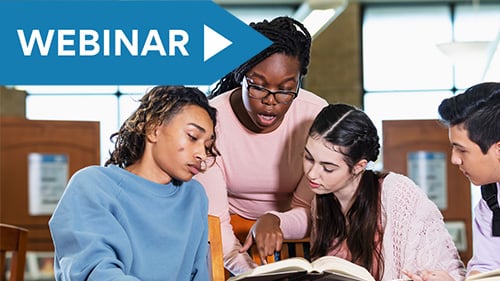Close Reading Doesn’t Have to Be Complicated—10-Minute Strategies for Busy Weeks
When the calendar gets crowded with winter concerts, makeup quizzes, assemblies, and general mid-year chaos, the idea of doing a full close-reading...
AP & Honors Mathematics
Explore Wiley titles to support both AP and Honors mathematics instruction.
Literacy Skills & Intensive Reading
Connections: Reading – Grades 6–12
Empower student success with a proven intensive reading program that develops strong reading skills in striving readers.
Drama, Speech & Debate
Basic Drama Projects 10th Edition
Build students’ confidence and competence with comprehensive, project-based theatre instruction.
Literature
Connections: Literature
Support learners as they study dynamic, relevant texts and bring the richness of diverse voices to students through literature.
Literature & Thought
Develop critical thinking, reading, and writing across literacy themes, genres, historical eras, and current events.
Language Arts
Vocabu-Lit® – Grades 6–12
Help students build word power using high-quality contemporary and classic literature, nonfiction, essays, and more.
Connections: Writing & Language
Help students develop grammar, usage, mechanics, vocabulary, spelling, and writing and editing skills.
Reading/English Language Arts
Measuring Up to the English Language Arts Standards
Incorporate standards-driven teaching strategies to complement your ELA curriculum.
English Language Learners
Measuring Up for English Language Learners
Incorporate research-based best practices for ELLs with an approach that includes a focus on language acquisition strategies.
Mathematics
Measuring Up to the Mathematics Standards
Incorporate standards-driven teaching strategies to complement your mathematics curriculum.
Foundations
Measuring Up Foundations
Help students master foundational math skills that are critical for students to find academic success.
Science
Measuring Up to the Next Generation Science Standards
Give students comprehensive NGSS coverage while targeting instruction and providing rigorous standards practice.
Assessment
Measuring Up Live
Deliver innovative assessment and practice technology designed to offer data-driven instructional support.
For a better website experience, please confirm you are in:
3 min read
 Dr. Brandon Abdon
Nov 5, 2024 9:52:12 AM
Dr. Brandon Abdon
Nov 5, 2024 9:52:12 AM
.jpg)
While most early literacy development occurs in elementary school, teachers in middle and high schools continue shaping students' reading abilities, comprehension strategies, and critical thinking skills, by focusing on the science of reading, these teachers reinforce foundational literacy skills and better contextualize many of the strategies they already use. Transitional literacy applies to these stages where students learn to apply their literacy skills in increasingly automatic and strategic ways and with increasingly complex and varied texts. Transitional literacy as it relies on the science of reading, aims to help students adapt to the advanced reading demands of post-secondary education and the world in general.
Importantly, the development of reading skills align with Jean Piaget's stages of cognitive development (Figure 1), specifically the formal operational stage, where high school students engage in more abstract thinking. Understanding this helps middle and high school teachers make better instructional decisions as they address the needs of their continually developing students.
 Understanding the Science of Reading in Middle and High Schools
Understanding the Science of Reading in Middle and High SchoolsThe science of reading is a comprehensive framework grounded in cognitive psychology and neuroscience, focusing on how the brain processes written language. While early education typically emphasizes phonics and decoding, middle and high school teachers focus on reading comprehension, vocabulary, and critical analysis. When those teachers contextualize their teaching through the science of reading, they recognize the comprehension, vocabulary, and critical analysis skills as multifaceted, combining background knowledge, vocabulary, language structure, literacy knowledge, and verbal reasoning. Though teachers often already leverage these by engaging students in activities that strengthen these areas—such as analyzing complex texts, practicing close reading, and discussing interpretations of literature and informational texts—by recognizing the relationship between those and the science of reading, those teachers can better help students recognize their skill development and develop their own approaches to texts.
For their students, who are generally in the formal operational stage of Piaget’s developmental theory, the science of reading becomes a tool for higher-order thinking. At this stage, students can think abstractly, formulate hypotheses, and consider multiple viewpoints. This cognitive growth aligns well with the science of reading as teachers introduce texts that require analysis, synthesis, and evaluation—skills that extend beyond basic comprehension and encourage deeper engagement with the material.
Transitional literacy is a concept that bridges early literacy skills to more complex, discipline-specific reading demands. During middle school students transition from learning to read to reading to learn, requiring them to apply reading skills across various subjects, such as science, history, and mathematics. By the time they reach high school, many of those same students have fully transitioned to reading to learn but still benefit from their teachers support, including teaching reading strategies tailored to each discipline. For instance, understanding the structure of scientific research papers or interpreting historical documents requires specific literacy skills that go beyond general comprehension.
High school teachers can guide students in developing these skills through targeted instruction in note-taking, annotating, and summarizing, which help students distill essential information from dense texts. These strategies align with the science of reading by providing structured approaches to enhance comprehension and retention.
Piaget’s theory of cognitive development highlights how students’ thinking evolves. By the time they reach high school, students are generally in the formal operational stage, where they can perform complex logical operations, understand abstract ideas, and think critically about hypothetical situations. Teachers leverage this developmental stage by introducing reading materials that require abstract reasoning and encouraging students to form hypotheses, draw connections, and evaluate arguments within texts.
The science of reading and transitional literacy align well with Piaget's formal operational stage. At this stage, students are equipped to handle the complex thinking required in both subjects and high school teachers can facilitate these skills through scaffolding and guidance. For example, teachers might use Socratic questioning to help students analyze a novel or engage in group discussions to dissect scientific texts. These approaches encourage students to think beyond surface-level comprehension and build cognitive skills essential for college and career readiness.
Middle and High school teachers play a pivotal role in fostering both foundational and advanced literacy skills. Through the science of reading, they reinforce comprehension and analytical skills, while transitional literacy instruction enables students to navigate varied textual demands across disciplines. These approaches not only support cognitive development as described by Piaget but also prepare students for the literacy demands of higher education and the workforce. By embracing the science of reading and transitional literacy, these teachers empower students to become critical thinkers and effective communicators, bridging the gap from early literacy to the complex, lifelong skills required for academic and professional success.

When the calendar gets crowded with winter concerts, makeup quizzes, assemblies, and general mid-year chaos, the idea of doing a full close-reading...

The goals of ELA instruction in middle and high school range from developing basic reading comprehension and writing skills to reading and writing...

Ask a teenager how they feel about reading, and you’ll likely get an eye roll, a groan, or a halfhearted, “I don’t like books.”

This webinar with Dr. Brandon Abdon, author of our AP Language and Composition and AP Literature and Composition AMSCO coursebooks, and guest ELA...

Transitional literacy focuses on bridging the gap between basic reading skills and more advanced literacy skills necessary for success during middle...

Annotation is a life skill, especially for our college-bound students. Reading something with a purpose, a strategy to comprehend at a higher level,...

Transitional literacy focuses on bridging the gap between basic reading skills and more advanced literacy skills necessary for success during middle...

How do I get my kids in reading and writing shape, so they can move forward? Here are 6 questions I am asking myself as I attempt to help students...

We know who finishes books in two days and who avoids them altogether. We know which students rely on plot summary, which struggle with stamina, and...

Join Laura Kebart (LanguageArtsTeachers.com) for a fun walkthrough of four strategies to keep your middle school ELA students engaged all year long!

I don’t know about you, but I hate grading reading comprehension questions. First of all, the answers usually could be “borrowed” from websites like...

Every ELA teacher knows how to do this, right? Not exactly. This webinar invites all ELA teachers for an in-depth examination of the art of close...
